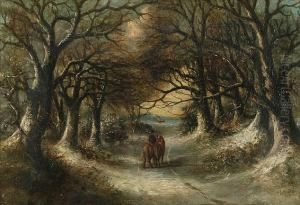John Sheppard Paintings
John Sheppard (also spelled Shepard, Shepperd, Sherpard, and other variations) was a significant English composer and organist during the Tudor period, and his music is often associated with the renaissance of polyphonic choral composition in England. While the exact details of his early life are not well-documented, it is believed that Sheppard was born around 1515.
John Sheppard's contributions to music primarily consisted of sacred choral works, including masses, responsories, and antiphons. His compositions were characterized by their rich textures and intricate interplay of vocal lines. He served as an organist and choirmaster in several institutions. One of the most notable posts he held was as Informator Choristarum, or master of the choristers, at Magdalen College, Oxford, where he was responsible for the education of the choirboys as well as composing liturgical music for the college chapel.
Sheppard's tenure at Magdalen College spanned a period of significant religious upheaval in England, as the country oscillated between Catholic and Protestant authorities under Henry VIII, Edward VI, and Mary I. Despite these turbulent times, Sheppard managed to navigate the changing demands on religious music composition, adapting his style to suit the liturgical requirements of both Catholic and Protestant services.
Among Sheppard's most admired works is the 'Media vita in morte sumus' (In the midst of life we are in death), a hauntingly beautiful and complex antiphon that showcases his mastery of polyphony and his sensitivity to text setting. This piece, along with his other compositions, has enjoyed a revival of interest in the 20th and 21st centuries, with performances and recordings by early music ensembles bringing his music to contemporary audiences.
John Sheppard died in December 1558, just as England was once again transitioning to Protestant rule under Elizabeth I. His music, however, has lived on, contributing to the rich tapestry of English Renaissance choral music and influencing generations of composers who followed him.



